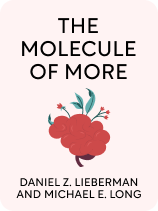

This article is an excerpt from the Shortform book guide to "The Molecule of More" by Daniel Z. Lieberman and Michael E. Long. Shortform has the world's best summaries and analyses of books you should be reading.
Like this article? Sign up for a free trial here.
Why is dopamine known as the motivation chemical? How does dopamine influence our thinking?
Dopamine is called the motivation chemical because it inspires us to think about and focus on future happiness and work towards something. By looking more closely at how this neurotransmitter works, you can understand why you’re motivated in the ways that you are.
Consider these explanations of how dopamine works and how it influences motivation.
What Chemical Motivates Us?
Dopamine is a neurotransmitter—a chemical for carrying signals between brain cells—that serves as both a motivator and a reward when you pursue new possibilities, or “what ifs.” Your brain releases dopamine when you encounter something new or unexpected, or when you make progress toward a personal goal. Furthermore, dopamine creates feelings of pleasure, so you’ll naturally want to pursue things that produce that dopamine high. Because of this, dopamine is sometimes called a motivation chemical.
In short, dopamine drives you to learn new things, have unique experiences, and get what you want.
‘What If’ Versus ‘What Is’
The human brain splits the world into two categories, which we’ll refer to as “what if” and “what is.”
“What if” means anything that would take effort to obtain. This category can refer to literal objects, like a bottle of milk that you need to go to the grocery store to get. However, it could also mean experiences you’d like to have or situations you’d like to be in; for example, meeting your favorite celebrity or starting a relationship with someone you’re attracted to. Dopamine motivates you to pursue things in the “what if” category.
Dopamine’s Counterparts: The ‘What Is’ Chemicals
Dopamine is the “what if” chemical because it helps you look to the future. There are a number of different chemicals responsible for helping you experience and enjoy the present. We’ll refer to them as the “what is” chemicals to provide a clear counterpoint to dopamine, the “what if” chemical. For example, one notable “what is” chemical is serotonin, which produces feelings of contentment and well-being (not to be confused with the dopamine-driven feelings of pleasure and excitement).
These “what is” chemicals are relevant to the discussion of dopamine because they often compete with it. It’s impossible to completely focus on the present and the future simultaneously because your brain can’t process all those chemicals at the same time.
(Shortform note: While this argument says that the “what is” chemicals work against dopamine, neurologist Robert Sapolsky says in Behave that dopamine and serotonin work together to motivate us. However, Behave also explains why different experts may make different claims about the relationship between dopamine and “what is” chemicals: The human brain is extremely complex, so the effects of any particular chemical often depend on countless other factors—not even neurologists fully understand how all of the neurotransmitters interact. In other words, it’s not totally accurate to say that dopamine is the “motivation chemical” or that serotonin is the “happiness chemical”; those are just simplified explanations that make brain functions easier to understand.)
Happiness Requires Both ‘What If’ and ‘What Is’ Chemicals
Since “what if” and “what is” work against each other, which should you focus on producing? Both, according to experts.
Healthy, sustainable happiness involves finding the right balance of dopamine and the “what is” chemicals; you’re happiest when you’re content with the present and excited about the future. Since it’s impossible to totally focus on the present and the future at the same time, this means shifting frequently between “what is” and “what if”—for example, you might work on a task that keeps you fully engaged, then when you’re done you feel excited about having gotten closer to one of your goals.
(Shortform note: This advice to balance “what if” with “what is” goes against the advice of many self-help experts, who say that the key to happiness is to always live in the moment. For example, in Maybe You Should Talk to Someone, psychotherapist Lori Gottlieb says she got over a crippling midlife crisis by learning to enjoy each moment as it comes (instead of obsessing over the past or worrying about the future). However, as we’ll discuss in the next section, people respond more strongly to dopamine than to the “what is” chemicals; therefore, it’s likely that placing such extreme emphasis on the present actually creates the balance discussed here.)
How can you achieve this balance? Experts suggest finding a career or hobby that requires you to concentrate on what you’re doing at the moment, but also to plan ahead and make progress toward longer-term goals. For example, practicing martial arts demands your full attention in the present, but it also involves striving for higher ranks and training for upcoming matches. Any type of creative work has a similar effect: You have to focus on the work you’re currently doing, but you also need to have an idea of what the finished product will look like, whether it’s a painting, a novel, or something else.
(Shortform note: Another practice that commonly helps people experience and enjoy the present is mindfulness meditation. This works because mindfulness really means awareness; mindfulness meditation trains you to be aware of yourself and everything you’re experiencing moment-to-moment. Once you’re aware of those experiences, you’ll be able to appreciate and enjoy them.)
We’ve Evolved to Neglect ‘What Is’
Unfortunately, humans haven’t evolved to be happy; we’ve evolved to survive, and survival is largely dopamine-driven. Early humans had to constantly search for what they needed to live, such as places to take shelter and animals to hunt. Taking the time to relax and enjoy what they already had wouldn’t have helped them survive. We’ve already discussed the effects this has at the individual level: the urge to chase whatever you don’t have, regardless of whether you really need it, or even whether it’s good for you.
At the societal level, that same urge has both positive and negative effects. On the positive side, it drives humanity to constantly seek new discoveries, new inventions, more territory, and more resources. This leads to incredible advancements in science and technology.
(Shortform note: The human drive for progress and discovery is at least partly the result of genetics; we’ve evolved to produce large amounts of dopamine and to feel motivated because of it. In that case, all of human civilization—including our countless inventions and the fact that we’re found all over Earth—is arguably part of what biologist Richard Dawkins (The Selfish Gene) calls the extended phenotype. “Phenotype” typically means all of an individual’s physical traits, such as height and hair color. However, Dawkins extends the definition of phenotype to include the ways an individual affects the world. Since our genes drive us to discover, invent, and produce, Dawkins might argue that everything we create is part of our phenotype.)
However, some experts say that human urges have also had terrible consequences for the planet—for instance, pollution, overuse of resources, and global climate change. Therefore, if we don’t find the right balance between “what if” and “what is,” the same dopamine-driven habits that kept our ancient ancestors alive could end up wiping us out.
| Evolution: Survival of the “Good Enough” It might seem strange that we’ve evolved into a species that’s able (and, at the moment, apparently likely) to destroy our planet and therefore ourselves. If we’ve evolved to survive, isn’t that counterproductive? However, evolution isn’t intelligent, and it can’t plan ahead—evolution simply means that organisms who are able to survive and reproduce in their current environment will do so. While evolution is commonly framed as survival of the fittest, some biologists argue that it would be more appropriate to call it survival of the adequate. In other words, evolution doesn’t try to create some hypothetical perfect species. Instead, it’s simply the process of “good enough” organisms creating more “good enough” organisms. Even though our dopamine-driven habits might prove self-destructive in the long run, they’re helping humanity to survive and reproduce right now. Therefore, the genes that produce those habits continue to pass from generation to generation. As a result, humanity keeps overusing Earth’s resources and degrading the environment, despite knowing the potential harm it could cause. |

———End of Preview———
Like what you just read? Read the rest of the world's best book summary and analysis of Daniel Z. Lieberman and Michael E. Long's "The Molecule of More" at Shortform.
Here's what you'll find in our full The Molecule of More summary:
- How dopamine drives ambitions, determines love, and influences thought
- What exactly dopamine is and how it affects us
- How some chemicals, like serotonin, actively work against dopamine






